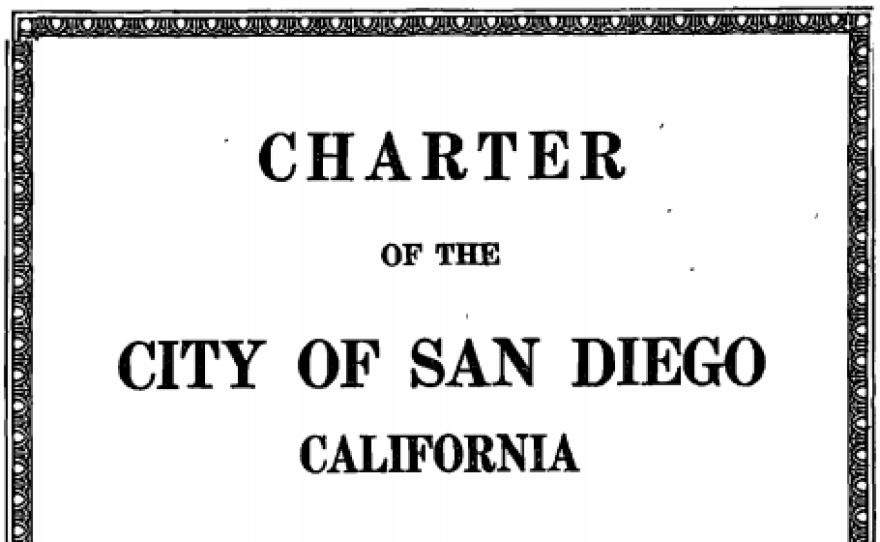Four San Diego City Council members will begin Thursday a year-long review of the city's charter and will suggest updates that will eventually go before voters. But it's not yet clear whether that process will involve simple language clarifications or substantial policy changes.
The 149-page charter acts as the city's constitution, setting the rules for the city's government and defining the roles and responsibilities of the mayor, city attorney and City Council. It says who can run for office and how their pay is determined, how elections are run. It also sets standards for police and fire retirement packages, and outlines how and when the mayor can veto a City Council vote.
Council President Sherri Lightner, who's heading the Charter Review Committee, said the purpose is not to make policy changes.
"The original focus of the committee is to provide cleanup and to bring the charter into the 21st century," she said. "I do not envision significant policy changes."
But City Councilman Todd Gloria has already requested the committee consider a significant policy change: new rules on how referendums qualify for the ballot. That request came after three City Council votes Gloria supported were blocked by referendums.
And City Councilman Chris Cate, the committee's vice chairman, said the review will provide opportunities for policy changes and cleaning up the charter's language.
Cate hopes the committee will review Charter Section 80, "Money Required to Be in Treasury," to streamline how funds for capital improvement projects are used.
The City Council created the temporary committee last month with the direction to "allow for an open and transparent public process to update the outdated, convoluted and confusing language in the current decades-old Charter," according to a report from San Diego's independent budget analyst.
The original motivation was to add a provision for removing an elected official from office because currently there isn't one, Lightner said. Council members noticed the problem during the 2013 sexual harassment scandal involving former Mayor Bob Filner.
The committee will meet once a month on Thursdays at 2 p.m. In addition to Lightner and Cate, a Democrat and Republican, the other two members are Democrat Marti Emerald and Republican Mark Kersey.
In mid-December, Lightner asked council members and department directors to tell her by Feb. 2 what charter updates and changes they would like the committee to consider. She said the committee will spend the next year reviewing the charter and will bring a set of proposals for changes to the City Council in January 2016. The council would then vote on whether to make those proposals into ballot measures, either for the June or November 2016 elections. The city's charter can only be changed by a ballot measure.
Lightner also said she wants to public to have input on the process by attending the committee meetings and emailing the committee. She said she's also trying to put a direct link to the committee on the city's homepage.
"As it stands right now, it's a regular council committee so you can communicate in that fashion," she said. "But we want to make it as convenient as possible."
Lightner said she will take input from her council colleagues and other city staff, and at the Feb. 5 meeting she will set an agenda for what charter sections the committee will focus on. So far, she said, she has heard from the city attorney, city clerk and Gloria.
San Diego's current city charter dates to 1931 and has been amended 245 times, according to the City Clerk's Office. The last Charter Review Committee was in 2007 and was made up of 15 citizens appointed by the mayor. After 51 meetings, its members recommended 14 charter amendments, six of which were grouped into three ballot measures for the June 2008 election. Voters approved all three, including increasing the City Council to nine members and scheduling a future vote on making the strong mayor form of government permanent.
Since 1931, there have been eight Citizen Charter Review Committees, which recommended 105 ballot measures, 79 of which were approved.
Many of the changes were tweaks to wording or procedural updates, but some made larger changes. For example, a 1941 ballot measure aimed to change council members' pay to $1,200 a year, up from the $10 a meeting they were receiving. It failed.
Twelve citizen petitions also have qualified to amend the charter, but voters only approved three. One that passed in 1911 stipulated council memers be elected by district, not the entire city.
Of the 10 largest cities in California, three have charters older than San Diego's, according to the independent budget analyst report. Sacramento's and Long Beach's charters date to 1921, and Bakersfield's dates to 1915.
Lightner said she views the review as essential because the charter is such an old document.
"It has continually been amended over the years and possibly not always in a way that makes it so it's easy to use," she said. "The structure is a little bit confusing. We've moved on from the city manager form of government, yet we've retained sections of the charter that refer to city manager."
While "charter review" may not sound exciting, Cate said the committee's work is extremely important.
"Charter review is not the sexiest topic in the world, but it's of utmost importance because this is our governing document and we want to make sure we're doing right by the taxpayers and residents, how we're operating and making sure we're doing it efficiently and spending their money wisely," he said.






